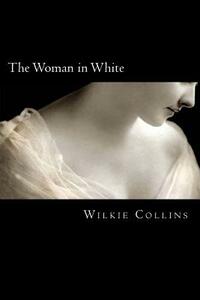You need to sign in or sign up before continuing.
Take a photo of a barcode or cover
This is a really excellent mystery and I found myself fascinated and frustrated in equal parts by the main conflict of this novel, particularly how it related to the power and agency or really, the complete lack thereof that women had over most areas of their life in this period to the point where I actually started doing research on English law during this time in history. The use of multiple narrators often works to the novel's benefit as (almost) every voice is wonderfully distinct and enthralling enough to keep the reader interested in the complex, twisty plot.
Overall I loved it I just have one specific critique so, here come the light spoilers for a 160+ year old book...
My strongest complaint about The Woman in White is how disappointing it is that Collins seems to continuously frame Walter Hartright as the protagonist and main hero of the story when a far more interesting, more intelligent, and more capable protagonist already exists in Marian Halcombe. I mean, I’m not surprised I’m just disappointed because over the course of the story, Marian is the one who (1) connects Walter with pretty much everyone he needs to be in touch with to get all of the narratives in the story compiled, (2) interacts with both of the main antagonists in the story and in fact is seemingly the only person (for the majority of the story) who consistently warns just how dangerous Count Fosco is and documents evidence for her claims, and (3) perhaps most importantly is the one who breaks her sister out of an asylum and serves as her primary carer for months on end. In addition to all of this, Marian also has a much more interesting journey over the course of the novel having to constantly find her own strength and stick to her guns when everyone seems to doubt her at every turn and (maliciously or not) tries to undermine her. Walter, though he does experience the inciting action and wraps everything up with a bow at the end (and spends 8-ish months in Honduras in the middle because why not?), remains a fairly static, boring narrator who is often, like most of the men in this novel, overly ruled by his emotions. There's nothing necessarily wrong with this, in fact I think it's interesting that on the whole, more men in this novel are shown to be, to varying degrees, at the whims of their emotions (Walter, Mr. Fairlie, Sir Percival), while quite a few of the women are generally shown to have a strong, calculated command over them (Marian, Mrs. Catherick, Countess Fosco); the problem comes for me with this in regard to how the novel is presented.
Collins notes at the outset of Mr. Hartright's opening that this book is intended to be organized similarly to the way witnesses would be presented at a trial and if that is the aim of the book, I'm inclined to want to hear the story framed by someone with a more measured voice. Yes, sometimes we do see Marian give in to the intense emotions that she’s feeling in her diary but we see time and again that externally she reins in her complex emotions at every turn in a way that deceives and even impresses the most conniving of villains in this story and in fact, there were a series of moments throughout the third epoch where I found myself missing her voice and her (specific, highly detailed) way of relaying events.
At the end of the novel Walter calls Marian the “angel of their story” and that’s all well and good but personally I think she should’ve been centered as the protagonist too.
Overall I loved it I just have one specific critique so, here come the light spoilers for a 160+ year old book...
My strongest complaint about The Woman in White is how disappointing it is that Collins seems to continuously frame Walter Hartright as the protagonist and main hero of the story when a far more interesting, more intelligent, and more capable protagonist already exists in Marian Halcombe. I mean, I’m not surprised I’m just disappointed because over the course of the story, Marian is the one who (1) connects Walter with pretty much everyone he needs to be in touch with to get all of the narratives in the story compiled, (2) interacts with both of the main antagonists in the story and in fact is seemingly the only person (for the majority of the story) who consistently warns just how dangerous Count Fosco is and documents evidence for her claims, and (3) perhaps most importantly is the one who breaks her sister out of an asylum and serves as her primary carer for months on end. In addition to all of this, Marian also has a much more interesting journey over the course of the novel having to constantly find her own strength and stick to her guns when everyone seems to doubt her at every turn and (maliciously or not) tries to undermine her. Walter, though he does experience the inciting action and wraps everything up with a bow at the end (and spends 8-ish months in Honduras in the middle because why not?), remains a fairly static, boring narrator who is often, like most of the men in this novel, overly ruled by his emotions. There's nothing necessarily wrong with this, in fact I think it's interesting that on the whole, more men in this novel are shown to be, to varying degrees, at the whims of their emotions (Walter, Mr. Fairlie, Sir Percival), while quite a few of the women are generally shown to have a strong, calculated command over them (Marian, Mrs. Catherick, Countess Fosco); the problem comes for me with this in regard to how the novel is presented.
Collins notes at the outset of Mr. Hartright's opening that this book is intended to be organized similarly to the way witnesses would be presented at a trial and if that is the aim of the book, I'm inclined to want to hear the story framed by someone with a more measured voice. Yes, sometimes we do see Marian give in to the intense emotions that she’s feeling in her diary but we see time and again that externally she reins in her complex emotions at every turn in a way that deceives and even impresses the most conniving of villains in this story and in fact, there were a series of moments throughout the third epoch where I found myself missing her voice and her (specific, highly detailed) way of relaying events.
At the end of the novel Walter calls Marian the “angel of their story” and that’s all well and good but personally I think she should’ve been centered as the protagonist too.
rip anne catherick you would’ve loved the coquette aesthetic
Excellent on audiobook and quite a literary accomplishment that a 26-hour-long audiobook can have my full attention the whole way through.
Wilkie Collins - what can I say? I’m absolutely flabbergasted that I’ve never read any of his work before, I’ve clearly been missing out. The Woman In White is described as the first and most influential novel in the Victorian genre to combine Gothic horror with psychological realism and it does it perfectly.
This is the story initially of a young man, Walter Hartright who has an eerie encounter (with a woman in white) on a road in the middle of the night whilst on the way to take up a position of drawing master to the beautiful Laura Fairlie. This encounter haunts him from the beginning of the narrative right to the very end of the novel exploring themes of insanity, identity, family dynamics and the role of the woman in society.
I loved this novel so much that I immediately was determined to research more about it. I learned that the author preferred that the reader should know as little as possible about the story so that the twists and turns would be even more surprising and effective. I simply cannot say anymore except to urge you that if you enjoy a good “sensation” novel, this superb story should be right up your street.
During the period that Collins was writing in, serialisations of novels were popular so The Woman In White would have been released part by part. I can imagine how simultaneously exciting and frustrating that must have been, especially if the previous section had ended on a cliffhanger. Furthermore, each section of the novel is told by a separate witness to the events which only added to my reading enjoyment, particularly as we started to get to know each character better as the novel continued.
The Woman In White is an outstanding piece of fiction that I’m so grateful to have finally experienced. It’s the sort of book you want to read all over again straight after finishing and I was so tempted to do just that. I can’t wait to check out the rest of his back catalogue!
Five perfect stars
This is the story initially of a young man, Walter Hartright who has an eerie encounter (with a woman in white) on a road in the middle of the night whilst on the way to take up a position of drawing master to the beautiful Laura Fairlie. This encounter haunts him from the beginning of the narrative right to the very end of the novel exploring themes of insanity, identity, family dynamics and the role of the woman in society.
I loved this novel so much that I immediately was determined to research more about it. I learned that the author preferred that the reader should know as little as possible about the story so that the twists and turns would be even more surprising and effective. I simply cannot say anymore except to urge you that if you enjoy a good “sensation” novel, this superb story should be right up your street.
During the period that Collins was writing in, serialisations of novels were popular so The Woman In White would have been released part by part. I can imagine how simultaneously exciting and frustrating that must have been, especially if the previous section had ended on a cliffhanger. Furthermore, each section of the novel is told by a separate witness to the events which only added to my reading enjoyment, particularly as we started to get to know each character better as the novel continued.
The Woman In White is an outstanding piece of fiction that I’m so grateful to have finally experienced. It’s the sort of book you want to read all over again straight after finishing and I was so tempted to do just that. I can’t wait to check out the rest of his back catalogue!
Five perfect stars
adventurous
funny
mysterious
medium-paced
Plot or Character Driven:
A mix
Strong character development:
Yes
Loveable characters:
Yes
Diverse cast of characters:
Yes
Flaws of characters a main focus:
Yes
started off listening to it on the CraftLit podcast but couldn't wait through all the cliffhangers (wilkie is a master). I did find it less suspensful after the big event but still a good read.





